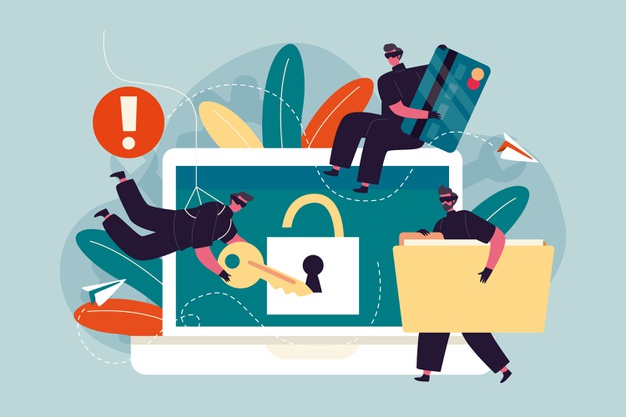
Many small business owners might believe they would never fall victim to cybercriminals, but this could be a fatal mistake for your business.
In fact, it’s a common misconception that cybercriminals only target large corporations. But a 2019 study found that 43% of all data breaches impacted small businesses. Once a data breach strikes, it costs businesses, on average, about $150 per record that was stolen. This could result in a loss of thousands of dollars, and what’s worse is that about 60% of small businesses that fall victim to a data breach shut down within six months.
And it’s not just external data breaches that small businesses have to worry about, there are many ways that cybercriminals can steal your digital assets, including:
- Phishing: This is one of the most common schemes that cybercriminals use to steal your information and data. It involves sending emails that often look legitimate with fraudulent links. The FBI found that these scams cost Americans $30 million a year.
- Ransomware and malware: These are programs that will damage your hardware or software or hold your information hostage until a fee is paid. These programs are usually installed by downloading suspicious files.
- Stealing passwords: Another common attack involves hacking into computers by stealing passwords. This is an easy trick for cybercriminals if you’re constantly using the same passwords for different accounts.
- Accidental information leaks: Not all data breaches are malicious, simple human error can also result in a data breach. We’ve all been guilty of accidentally hitting the “reply all” button on an email. Now imagine you, or an employee, accidentally sends out an email that was meant to be confidential or contained client information. This could wind up being a costly mistake for your company.
Chances are you don’t have a dedicated IT staff that can regularly monitor cyber risks, which can leave you especially vulnerable for cyberattacks. With so many cyber-related risks out there, how can small business owners protect their valuable information? This is where Cyber Liability insurance comes in. It can help your business recover from these incidents, but who really needs Cyber Liability? Ask yourself these questions:
- Do you handle online transactions?
- Do you electronically store customer and employee information, such as credit cards, addresses, emails, or bank information?
If you answered yes to either of those questions then you should definitely consider purchasing this policy.
What is Cyber Liability insurance and what does it cover?
Cyber Liability insurance is designed to protect your company’s data, digital assets, and sensitive information. Keep in mind, coverage can vary depending on the individual risk profile of your company, however, a standard policy can cover the following elements:
- Loss of digital assets
- The cost of repairs to hardware or software that are damaged in a cyberattack
- Cost of notifying customers impacted by a data breach
- Extortion costs
- The cost of crisis management, such as PR and marketing
- Lost business income if operations are interrupted
- Lawsuits from impacted employees or customers
These elements can be covered whether the origin of the breach is internal, such as an employee leaking sensitive information, or an external breach from hackers.
What’s excluded from a Cyber Liability policy?
Again, every policy will be different based on the carrier and your business needs, however as a general rule Cyber Liability will not cover the following elements:
- Physical property damage: this is covered under General Liability or Commercial Property policies
- Loss of first-party intellectual property
- Loss of future revenue: While this policy may cover business interruption costs during a specific period it won’t cover future losses
Is Cyber Liability insurance expensive?
Just as there’s no one-size-fits-all coverage, there’s no standard price tag for Cyber Liability and the price of your premium is determined based on several factors, including:
- Industry
- Number of employees
- Claims history: if you have previously filed claims your premium might be higher
- Coverage limits: If your company has a complex set of coverage needs your premium might be higher
However, there are some ways you can save money on your policy. If you can demonstrate a strong safety record and proactively minimize your liability you can lower your premium. Here are some tips to keep in mind:
- Regularly update passwords and use two-factor authentication
- Install anti-virus software
- Use a cloud service or external hard drives to backup important documents and information
- Train employees about safe computer practices, like not sharing passwords
- Limit access to devices to only those employees that need them
Final Thoughts
The cyber-threats facing small businesses continue to evolve every day, so it’s important to take proactive steps to protect yourself. Don’t fall into the trap of thinking your business isn’t vulnerable to cybercriminals. If you handle any online transactions or sensitive information, you’re susceptible to hackers.
It’s important to put a plan in place to keep your digital assets safe, however, there’s nothing that can completely eliminate the threat of data breaches. It’s important to talk to your insurance provider about Cyber Liability insurance. This is the only policy that’s designed to help your business recover from a cyberattack, and it can help give you peace of mind to focus on growing your business.
By Emily Lazration, CoverWallet
Emily is the Content Marketing Specialist at CoverWallet, a tech company that makes it easy for businesses to understand, buy, and manage commercial insurance online. She has written for several outlets including Inc., Ooma, and Fundera covering small business news and advice.




